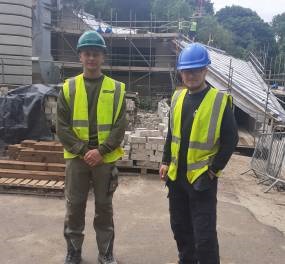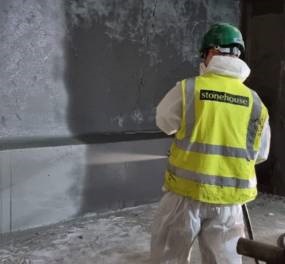Our apprenticeship experience: the process, considerations and outcomes
With us coming to the end of National Apprenticeship Week 2024, today we share a guest blog from PCA member Graham Stone of Stonehouse Property Care.
Guest blogs are always welcomed and provide an opportunity to see and hear things from an employer's perspective. In this blog, Graham takes the time to share his first apprenticeship experience describing the process, the considerations, potential obstacles, and of course…the potential business gains.
To find out what Graham has to say, keep scrolling down...
Gone are the days of easy recruitment?
As many within the construction industry will know; recruitment over the last few decades has fundamentally changed. From our perspective within Stonehouse, this feels particularly true for the specialist services we offer.
Gone are the days when a local newspaper advert was followed by a small sack-full of applications desperately keen to be considered. Speculative applications from experienced operatives outside the area were a norm and a “job-for-life” was the ultimate hope for career progression and financial stability.
Decline of UK talent and the need to think differently about recruitment
Undervaluing and underinvestment in secondary and tertiary practical/trade courses has meant that companies such as ourselves have witnessed a rapidly declining availability of UK talent. Post Brexit, the pool of skilled workers from abroad has also become hard to attract. Recruitment is a real issue!
It was while thinking about this new dilemma that we decided to seriously explore apprenticeships. I personally have always been fully committed to investing in training and it made absolute sense to consider and offer specific apprenticeships alongside our in-house mentoring to help grow our own skilled team.
First considerations when it comes to apprenticeships
It is relevant to mention that before you consider any apprenticeship you have to first find your apprentice! This is not without its challenges. We use a mixture of jobs boards, local social media, recruitment agencies and colleges with variable success.
There are also real disappointments – eager new recruits for many reasons do not live up to expectations or simply do not enjoy the demands of manual work. We work hard at the interview stage and insist on a trial period before committing to the costs of external training.
Once you have your apprentice, the process begins
Having found your apprentice, the training challenge starts and hopefully the investment slowly begins to grow. Our first apprentice (Tom) had construction experience and was bright, ambitious and disciplined - ideal characteristics for our first trial of the PCA apprenticeship scheme. Commitment is essential for both parties along with regular communication and encouragement to monitor attendance and support deadlines.
The costs - the impact on the business
Employing an apprentice as a full-time member of the operations team means every day away through training is a missed day on-site. It goes without saying that your apprentice will need to head off on the very busiest week, when you need all hands-on deck! This is the moment for some discipline, from employer as well as employee. Planning is all important; for us the up-front 18-month calendar with residential stay-aways dates and exams was crucial.
To balance this cost, be alert to any funding. We found our apprenticeship was offset by a CITB grant which covered the academic element with some contribution to accommodation costs. We also use the tax rate applicable to apprenticeships, removing the employer NI contribution. There is some paperwork involved but it’s worth the time.
What did we gain from it?!?
The ability to offer an apprenticeship in parallel with our own on-site, live projects is ideal. Theory and assignment-based coursework is structured and delivered by professionals, expert in the current theories of our industry, however putting theory into practice, in my opinion, is often the most successful way to reinforce learning. And I’m more than happy for new ideas to filter back from the classroom. For me it’s a win-win situation.
I firmly believe it is my duty as an employer to add skill, knowledge and competence. Though we never encourage moving on, the NVQ Level 2 Qualification is a respected and marketable qualification for the future! I’ve also noticed a real respect from fellow colleagues who have acted as mentors during apprenticeship.



Don’t just take my word for it. Read what our apprentice Tom thinks…
I have written from my perspective as an employer describing my experience with apprenticeships. However, what did our first apprentice Tom think of it? It would be best hearing directly from Tom himself:
“I thoroughly enjoyed the apprenticeship as it helped me learn new skills within the waterproofing industry. It helped build upon my communication skills as I was encouraged to network with other people with similar skills and interests. I had an understanding of the construction industry before joining Stonehouse, but the waterproofing apprenticeship helped further my knowledge in the field and all aspects of construction.
“I’m very much enjoying my time at Stonehouse and with the apprenticeship now under my belt, i’m looking forward to gaining more experience and future qualifications.”
In Conclusion
For both the company and Tom, it’s a successful outcome and through this apprenticeship, Tom has now been promoted within Stonehouse and is being offered relevant in-house and industry training over the next year with the view to looking at other PCA training in the future. We have trained…now we are keen to retain…. and based on our experience of this apprenticeship, we have committed two new recruits to the Structural Waterproofing Apprenticeship and the Damp and Timber Apprenticeship this year.
Interested to find out more?
Firstly, our thanks to Graham for sharing his first time experience with apprenticeships. Hopefully, some of you reading this blog might be inspired and encouraged by Graham's journey. As we have said before, at the PCA, we are passionate advocates for apprenticeships. It is a very rewarding experience watching candidates grow in confidence and skills to eventually become productive members of staff. If this is something you feel might work for you, then we would encourage you to find out more.
If you are a PCA member, click on the button below to find out about specialist apprenticeships for your sectors. Alternatively, for a wealth of information and guidance, check out the national website for apprenticeships.
More about PCA apprenticeships >